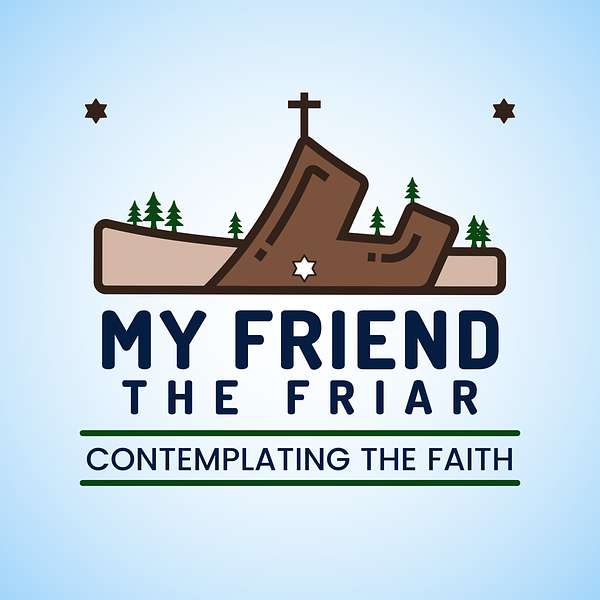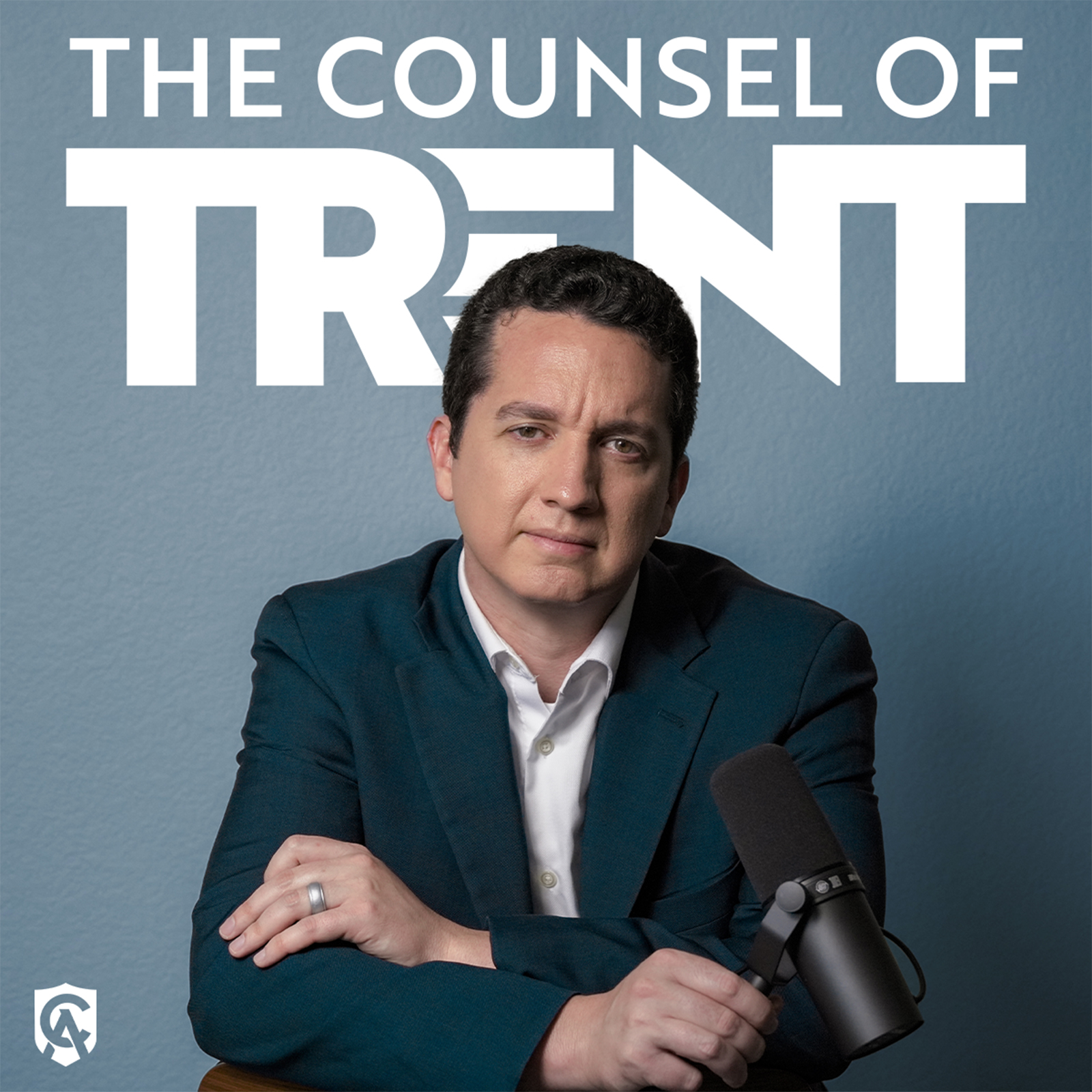
My Friend the Friar
A podcast where we learn about our faith and share what it takes to live a Catholic Christian life through conversations and contemplations with my friend the friar, a Discalced Carmelite Priest.
My Friend the Friar
Exploring Virtue and Sin: A Journey towards Self-Awareness and Grace
In this episode, John contemplates sin, virtue, and the role of self-awareness has in our ability to cooperate with God's grace. This episode is not just about introspection; it's about understanding the profound impact we can have on others through virtue. Share this with your circle and help us reach more hearts and minds. We hope this episode will inspire you to become more self-aware and cultivate virtues in your life.
Have something you'd love to hear Fr. Stephen and John talk about? Email us at myfriendthefriar@gmail.com or click here!
Welcome to the my Friend the Friar podcast and thanks for listening. If you like my Friend the Friar and want to support us, please consider subscribing or following us. If you haven't already done so, and if you found us on YouTube, then don't forget to click the notification bell when you subscribe so you'll be notified of new episodes when they release. Thanks again and God bless. Welcome to the podcast. Thanks for joining me and Lenny the kitty cat the quiet cat this week, while Father Stephen is still on retreat, I'd like to propose something to you for your consideration and contemplation this week. That is virtue and sin. Also, to start, I wonder how does someone grow in their self-awareness and recognize their sinfulness in order to get to the root of sin in their life? We've talked about the evolution of the concept of sin throughout history before, but, for a quick recap, the break in our relationship with God is called sin, and the consequence of that break is being in a fallen state, which affects the way we perceive ourselves, others, creation and even God himself. So, generally speaking, another way of thinking about sin is sin is an abuse of a good. So, for example, there would be times where I choose wrongly in how I respond to God or to my desire to attain a good or to use a good. And this is the concept of missing the mark, so to speak, not so much the broken relationship with God, but the other aspect of it, which is the defect in my response to God. So I make a lot of presumptions when I talk or think about sins. Another, stephen, likes to tell me that I think of these things very particularly along religious lines. But hey, the catechism says that religion is a virtue, so I'm going to roll with it today. So, speaking of virtue, it's one of our considerations. This episode is how do we define it? And I've been trying to form my own working definition of virtue and hopefully I'm not too far off and Father Stephen listens to this and comes back. He can correct me for my potential lack of understanding. But for a very rudimentary definition, I'm going to go with virtue is goodness or excellence. So not in the case that it is For a very rudimentary definition, I'm going to go with virtue is goodness or excellence. But in this case, in our case, it is goodness or excellence directed toward God, not like I'm really good at chess, but my trying to aspire to the goodness of God. So I think it's really much more than that, but I'm not going to try harder at this point in my thoughts to expand on my definition. I'll save that for later.
Speaker 1:So, going further, I have two questions for everyone to consider. Do you think it's easier for people to identify in themselves a lack of virtue, or is it easier to identify the presence of sin? That's one question. So the lack of virtue or presence of sin, which is easier to identify in yourself? Second question is a lack of virtue sinful or does a lack of virtue point to something that is sinful? So I've also thought about how does someone navigate this thought. How do I navigate this thought when you think of yourself in isolation and how do you go about it when you think of yourself in relation to other people? So, like virtue by yourself, virtue in community, and I would propose that you can't be virtuous or good or lacking sin by yourself, because it always has to be thought of in a relation in relation to God. So therefore, social virtue, or virtue in a social setting, is an extension of God's goodness or excellence through you, to your community, to the people around you.
Speaker 1:Okay, so back to my last two questions. Is a lack of virtue sinful, or does a lack of virtue point to something that is sinful? I think a lack of virtue is not sinful, but points potentially towards something that is like a way in which we are imperfectly responding to our desire to live as God's child, so the whole missing the mark in our relationship with God. That's what I think a lack of virtue points to. So not that we're doing something bad, it's just we're not perfect, and I feel pretty confident in that response too, because even the most virtuous person falls short of God's perfection and goodness. Thus they have room to grow more in their virtue.
Speaker 1:So to the question of do I think it is easier for people to identify in themselves a lack of virtue or the presence of sin, as I have been thinking about this, I think it's an interesting question, but I'm not sure it matters so much, but I do think it's interesting. What I think it does, though, is it calls into question one's self-awareness, and I think this sort of self-awareness begins when you encounter someone who shows virtue or goodness which directly contrasts your sin. I think that's the trigger in that growth. So fidelity in the face of your infidelity, charity in the face of your greed, patience in the face of your impatience, love in the face of hate. So I think that also is exactly what happens when you encounter Jesus. In response to that encounter with Jesus because God is the first mover you respond. You have some kind of response to that shock of the goodness in contrast to your lack of goodness. But when you encounter Jesus and you come into that moment where you're shocked at the difference, I think that's when you begin or continue your personal conversion. And so, as kind of a quick example that I'd like to make, I want to say a little bit something about my wife.
Speaker 1:She's a teacher at a middle school, so she teaches sixth, seventh, eighth grade and very specifically at her school she teaches immigrant students who are also very specifically new to our country, who also very specifically do not speak English. So most of the time, very often at least, they're coming from very bad living conditions, extreme poverty, fleeing local warlords or drug cartels or gangs or family abuse I mean just really rough lives, coming to our country, don't speak the language, and now they're looking for opportunity. And in her class she calls herself Laurena or the Queen and she says this is a joke, but to me just watching it hints at something that I think is very Christ-like in her classroom, whether or not she realizes it, and again, I think it's not where they want to talk about it. So, because she's the Queen, her students see her as in a place of authority, not just as the teacher, but also as the Queen. She lives out her role in her classroom as the Queen by bringing their lives into order in this new country. So, where they don't understand the culture of the language, when they arrive, she teaches them and slowly, all that chaos, it moves from chaos into order. Right, they can understand, they can read, they can write, they can communicate where once they couldn't do any of those things. And again, she continues to serve them by being this person who offers comfort and safety to them when they've come from all these rough conditions, and she works to make her classroom feel like a second home for them. She does this through unwavering consistency and high standards and service to the kids. In a nutshell, she says this is how you're to behave and grow in our class and this is how I will treat you, regardless of how you behave and grow. And the kids respond to that. Right, they're coming from something and they have this shock of the way she engages with them, this goodness that is so contrasting to where they're coming from, and they respond and it's amazing to see how these kids grow and develop and love her. I mean, it sounds like she's a pretty good queen to me, but I might be biased, but anyway.
Speaker 1:So when people I say all that to say when people encounter this radical goodness in their lives in contrast to their sin, it's true, some people and I don't know why some people are kind of repulsed or pushed, turned away by it, but for most people, I think the goodness draws us in right, it draws us closer and you know, this conversion that I was thinking about when you encounter Jesus makes me think of John 12, 24. He says Amen, amen, amen, I say to you, unless a grain of wheat falls to the ground and dies, it remains just a grain of wheat, but if it dies, it produces much fruit. So we encounter Jesus and his goodness. His goodness, in contrast to our missing the mark or our lack of virtue, brings us into self-awareness and then, through the consistent and frequent encounters with Jesus, we're drawn deeper into our conversion and then, through cooperating with God's grace, we begin to become ordered inwardly and we become more virtuous and more self-aware. And it continues, it grows, but it can't just end with each of us as individuals. And that makes me think of Mark, chapter 7. I think it's in the Gospel of Luke as well.
Speaker 1:But though, why do you notice the splinter in your brother's eye but don't perceive the wooden beam in your own eye? Right, he says how can you say your brother, let me remove that splinter from your eye while the wooden beam is in yours? It calls you a hypocrite, right, remove the wooden beam from your eye first, then you'll see clearly to remove the splinter from your brother's eye. And so then, how do we get the beam out of our own eye before we can help someone else, Right, our friends or family, our loved ones, our community?
Speaker 1:I think the sacraments, those encounter with Jesus. So living a sacramental life, and maybe particularly confession, is kind of the driving factor here, at least for me. I've been going to confession way more regularly lately and I've realized that I many times am confessing the same sins over and over. So in this effort to live a more sacramental life and in my more frequent and regular encounters with Jesus, I feel like for me God is helping me to grow in my self-awareness Again, because the more I go and the more times I engage with Him and I interact with Him, I'm just shocked because I just keep encountering His radical goodness and the absolute, direct contrast to my sinfulness or my lack of virtue.
Speaker 1:So let's say that in your encounters with Jesus you become self-aware about something that needs to change in you, some personal conversion that needs to take place. You can't just continue the behavior and use confession as a get out of jail free card. You can't abuse God's grace and you may have to balance that against things that are really really difficult for you to control, like addictions, lifelong behaviors. That stuff is real, it's a challenge for a lot of us. But how do we get to that root of sin in our lives? How do we strive for greater virtue? And I think that's why it's important for us as Christians to have daily prayer, daily personal prayer time, because as our interior selves become more ordered by our encounters with Jesus, I believe that's when we will naturally begin to transform the people and the world around us, because we're not called to just self-perfection. We're commanded to love one another, right To transform the world, and as we become ordered ourselves, we become what Christ like, and so Christ is truly the one who's ordering and transforming the world around us, not you or me.
Speaker 1:I do want to end on this thought, which I believe is related to everything. It seems there's a lot of people around the world right now that are upset with the church or people in the church. It seems everyone is disappointed or angry or whatever because of their bishop or the pope or their local priest or the nuns, like somebody did do or somebody didn't do. Everybody seems upset, but I want to encourage people to take today's episode into consideration and think, both bigger and smaller, and so I want to ask you where do you think that our pope and the bishops and the priests and the nuns come from? They come from our families.
Speaker 1:So if we neglect our personal responsibility of prayer and personal conversion, how can we expect the church to be any different from the rest of the world? You know it's easy to voice our opinions about things and there are a lot of people and podcasts and YouTube channels out there where there's just so much complaining and anger, and it's easy to and it feels good to join in and point out the speck in our brother's eyes, but I encourage everyone to look inward first. Work on the beam in your own eye and don't find time. Make time to pray and contemplate and work out your personal conversion, because as you continue to encounter Jesus, you can't help but be convicted, and as you become more Christ-like, the world around you will be transformed too.
Speaker 1:Thanks for joining me today. It means so much to Father Stephen and myself to be able to bring these conversations and thoughts to people around the world. Before I let you all go, I'm going to ask you please do us a favor. Share this podcast with others and if you find us or watch us on YouTube, subscribe, leave a comment like the episode, all that kind of stuff. If you listen to us on a podcast platform, please follow us so you don't miss new episodes, and consider leaving us a review. All those things absolutely help grow what we're doing here. Thanks again and see you next time. God bless.





